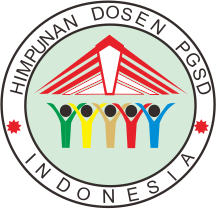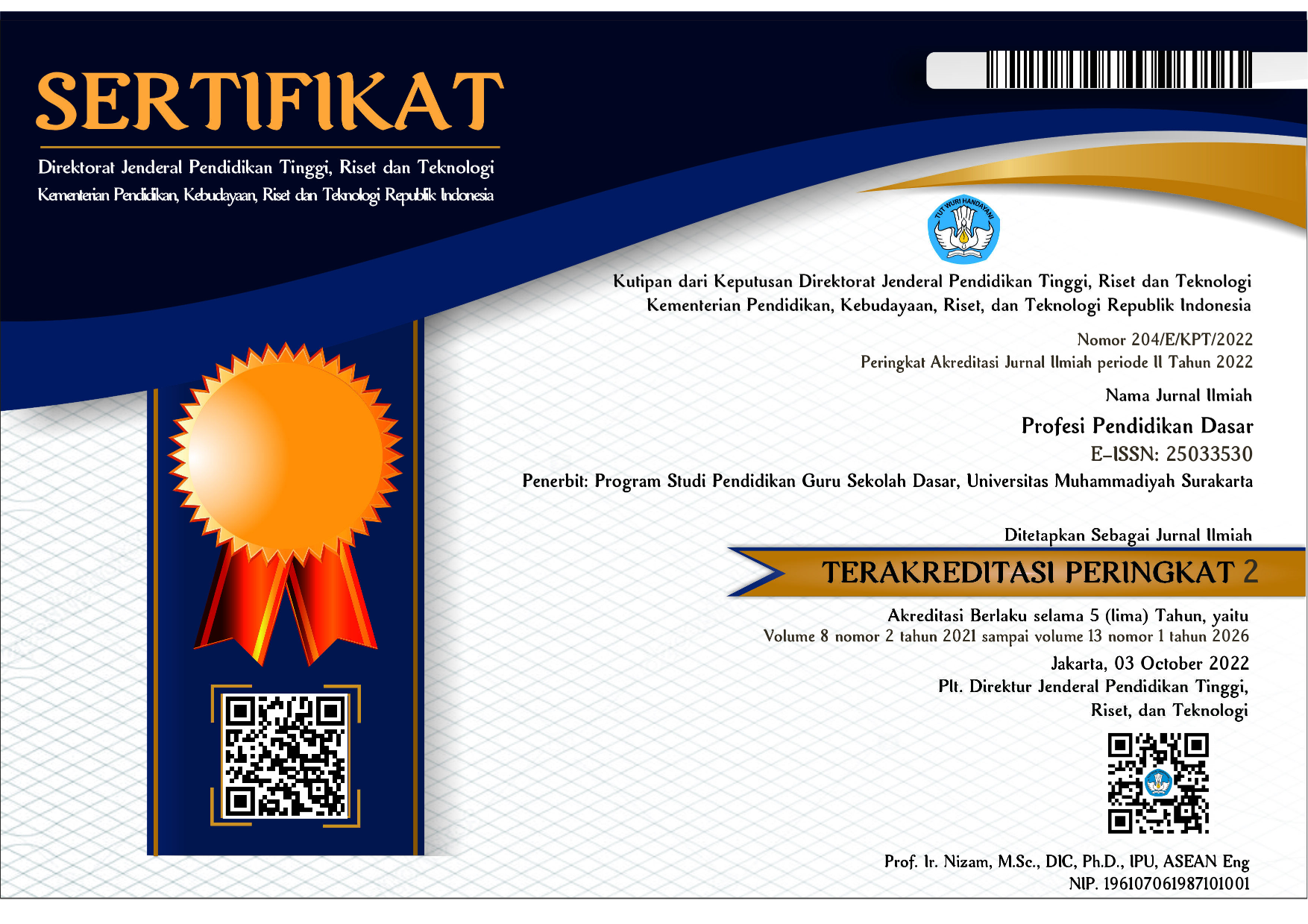PENGEMBANGAN MODUL MATEMATIKA 3 DENGAN MODEL NHT UNTUK MENINGKATKAN PRESTASI BELAJAR MAHASISWA PGSD UNIVERSITAS PGRI YOGYAKARTA
Danuri Danuri(1*)(1)
(*) Corresponding Author
Abstract
Abstract: This research aims to produce learning media in the form of mathematics module 3 with cooperative learning type numbered head together (NHT) to improve student learning achievement of PGSD in response aspect. students towards developed Modules. This research is a Research and Development (R&D) which using ADDIE (Analyze, Design, Development, Implementation, and Evaluation) model with Math Module 3 product using cooperative learning type numbered head together (NHT). The development process was done by several stages of analysis, design, development, implementation, and evaluation. The development model used is a procedural development model, which is a descriptive model, outline the steps to be followed to produce the product. The results showed the quality of Mathematics Module 3 with cooperative learning type numbered head together (NHT) in good category with the percentage of idealization of 73.06% with the detail of content feasibility component in both category with the percentage of 71,39% of the idealization, the linguistic component in good category with the percentage of 74.55% of the idealization, and so are the components of the presentation in either category with an ideal percentage of 74.76%. Response to this module belongs to the category of positive responses with a score of 63.69 from the ideal maximum score of 80. Based on the post-test value, Mathematics 3 module with cooperative learning type numbered head together (NHT) has been successful in improving learning achievement by post-test score of 77.09.
Keywords
Full Text:
PDFReferences
Arends, R.I.. (2001). Exploring Teaching: An Introduction to Education. New. York: Mc Graw-Hill Companies.
Hamzah, B. Uno. (2008). Teori Motivasi dan Pengukurannya. Jakarta: Bumi Aksara.
Isjoni. 2007. Cooperative Learning Efektivitas Pembelajaran Kelompok. Bandung: Alfabeta.
Mahmud. 2010. Psikologi Pendidikan. Bandung: Pustaka Setia.
Ngalim Purwanto. (2006). Psikologi Pendidikan. Bandung: Remaja Rosdakarya.
Purnomo, Heru dan Arrofa Acesta. 2017. “Pengembangan Bahan Ajar dan Penilaian Otentik Mata Kuliah Pendidikan IPA sekolah Dasar. Jurnal Profesi Pendidikan Dasar, Vol. 4, No. 2. Desember, hlm 167.179. http://journals.ums.ac.id/ index.php/ppd/article/view/5359
Rusman. 2012. Model – Model Pembelajaran. Depok : PT Raja grafindo Persada.
Rusnilawati dan Eva Gustiana. 2017. “ Pengembangan Bahan Ajar Elektronik (BAE) Berbantuan Flipbook Berbasis Keterampilan Pemecahan Masalah Dengan Pendekatan CTL Pada Pembelajaran Matematika Kelas V Sekolah Dasar. Jurnal Profesi Pendidikan Dasar, Vol. 4, No. 2, Desember, hlm 190-202. http://journals.ums.ac.id/index.php/ppd/article/view/5450
Sardiman. (2005). Interaksi dan Motivasi Belajar Mengajar. Jakarta: Rajawali Press.
Sardiman. (2007). Interaksi dan Motivasi Belajar Mengajar. Jakarta: PT Raja Grafindo Persada.
Slameto. (2003). Belajar dan Faktor-faktor yang Mempengaruhinya. Jakarta: Rineka Cipta.
Sumadi Suryabrata. (2006). Psikologi Pendidikan. Jakarta: PT Raja Grafindo.
Syaiful Bahri Djamarah. 2008. Psikologi Belajar. Jakarta : Rineka Cipta.
Tran, Van Dat. (2012). The Effect of Jigsaw Learning on Student’ Attitudes in a Vietnamase Higher Education Classroom. International Journal of Higher Education. Vol.1, No.2. hlm 9-20.
Trianto. (2010). Mengembangkan Model Pembelajaran Tematik. Jakarta: PT Prestasi Pustaka.
Trianto. (2011). Model Pembelajaran Terpadu Konsep,Strategi Dan Implementasinya Dalam Kurikulum Tingkat Satuan Pendidikan (KTSP). Jakarta : Bumi Aksara.
Winkel,W.S. (2004). Psikologi Belajar. Jakarta: Gramedia Pustaka.
Article Metrics
Abstract view(s): 642 time(s)PDF: 536 time(s)


















